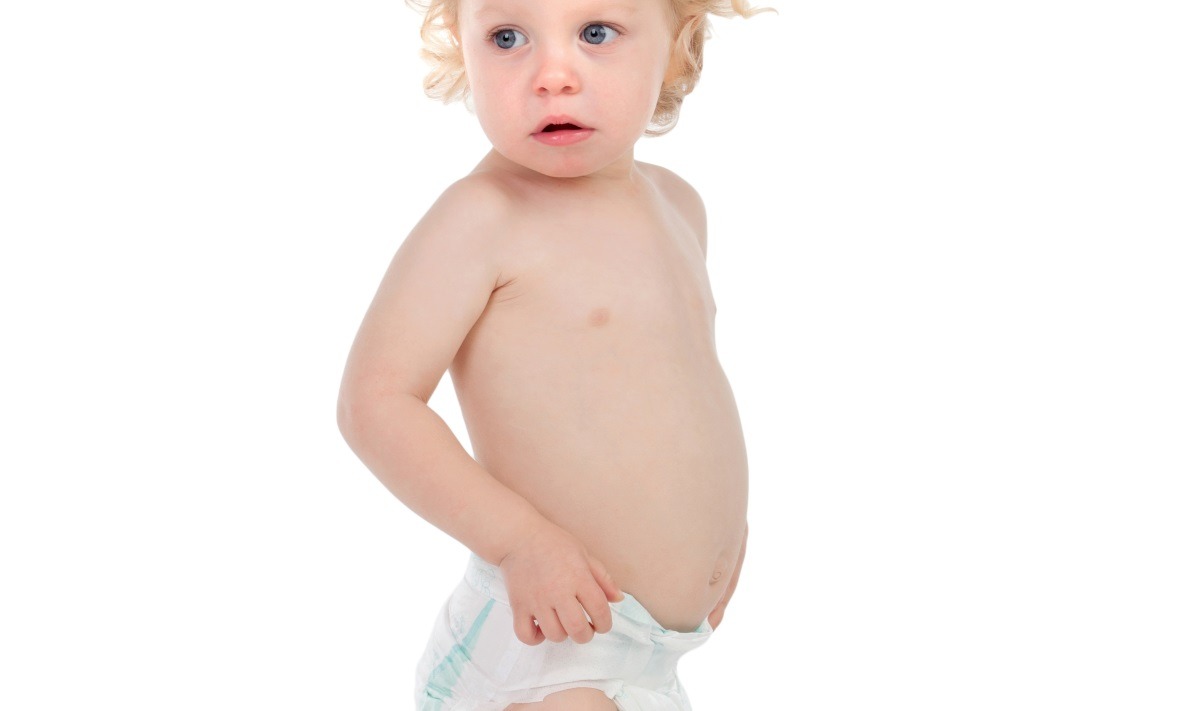
Have you noticed mucus in your toddler’s poop? While small amounts of mucus can be completely normal—especially if it appears infrequently—large amounts or a significant increase are not. Here, we’ll discuss some possible reasons for mucus in your toddler’s stools.
Mom’s Question:
My toddler’s poop is mucousy. Just recently, she was constipated, and at that time, she also didn’t have much appetite. She is now back to normal with regard to appetite and constipation, but now her poop seems to be mucousy. Can you tell me why?
Thanks,
Jessica
1. When Mucus in Toddler Poop is Normal
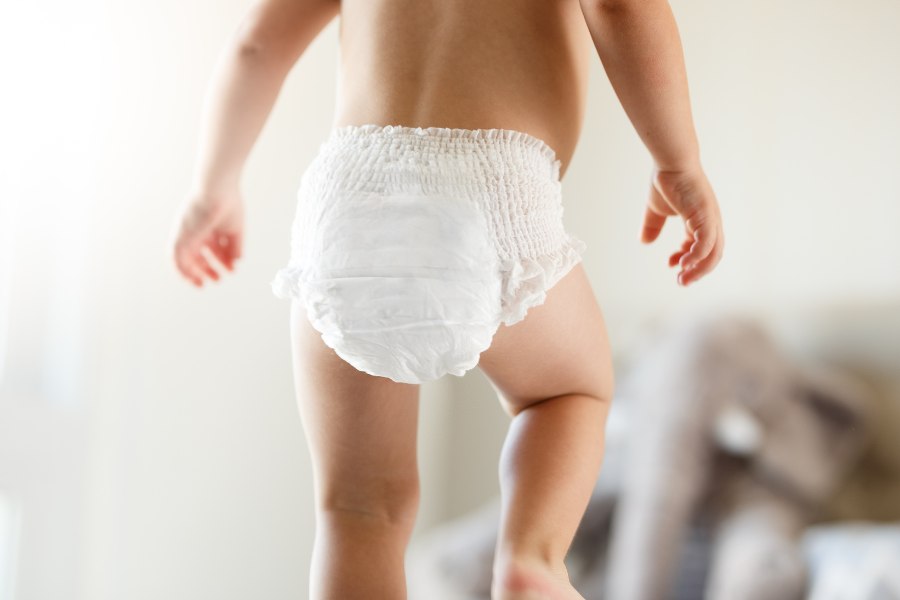
It’s normal for humans—including toddlers—to have some mucus in their poop. Mucus is naturally present in the intestines and plays a crucial role in protecting the lining of the intestinal wall. It helps clear bacteria and prevents inflammation and infection. Sometimes, this mucus can attach to stool as it moves through the intestines and colon, making occasional appearances in bowel movements.
Dietary changes can also affect the presence of mucus in stools. However, large amounts or significant increases in mucus are not considered normal and may warrant further investigation.
2. Constipation
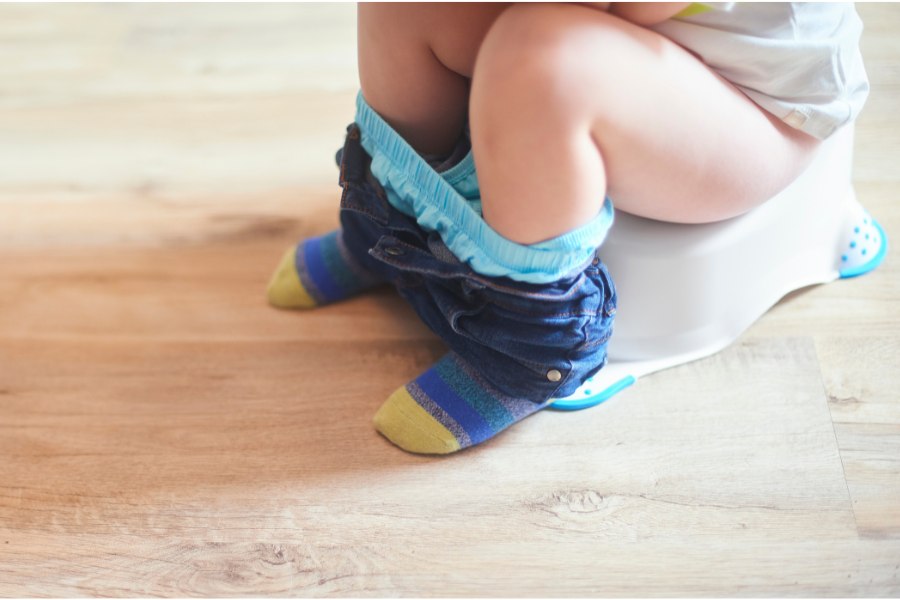
Constipation is common in children. This is often temporary and usually resolves on its own (unless caused by some underlying illness).
In children with constipation, the intestines move slowly (i.e., movement of stool in the gut is slow), and the large intestines usually absorb most of the water from their intake, resulting in dry and solid poop at the end of the rectum. When this happens, the child may feel pain in his anus whenever he tries to push his poop out.
The possible causes of constipation in children include:
- Processed foods – these food lack fiber in their products; hence the child becomes constipated when these processed foods become a part of their everyday diet.
- Milk – certain types of milk, including cow’s milk, are heavy and irritating to the baby or kid’s tummy. The milk protein particles are big and are poorly broken down for absorption in the gut; hence the child becomes constipated.
- Stress – Stress can trigger diarrhea or constipation in children.
- Dehydration – when the body lacks water, the poop becomes hard and dry, making it difficult to pass out.
- Changes in routine – changes can disturb healthy bowel habits, therefore causing stress on the body and, consequently, constipation.
- Potty training – when going to the potty is a new thing for your kid, the common coping mechanism of the body is to hold everything in until it gets used to a new routine or environment. Hence, constipation is common in children undergoing potty training.
- Medicines – some medications can cause the bowels to slow down and cause constipation.
When your child is constipated, the body will produce mucus as a defense mechanism to avoid irritation or friction between the lining of the intestines and the hard and dry poop. The poop then becomes enveloped in mucus to come out of the rectum easily.
To avoid your kids from getting constipated:
- Put him on a high-fiber diet (more fruits and veggies).
- Encourage him to do more physical activities.
- Enforce a good bowel routine and habit.
- Increase his fluid intake.
- Reduce dairy products,
- Use oatmeal instead of rice cereal, and
Complications of constipation may include anal fissure or tearing of the anus, causing blood in stools (or bleeding rectum or anus), and recurrent abdominal pain.
Call your doctor if your child has not pooped for more than a week, has abdominal pain accompanied by fever and vomiting, and appearance of hemorrhoids, anal fissures, and leakage of stools in his anus.
If her constipation or illness is gone and your daughter is back to eating normal portions, her poop should also be normal within a couple of days. However, if you don’t know what caused her constipation, you’ll need to figure it out to be able to avoid it going forward.
3. A Cold
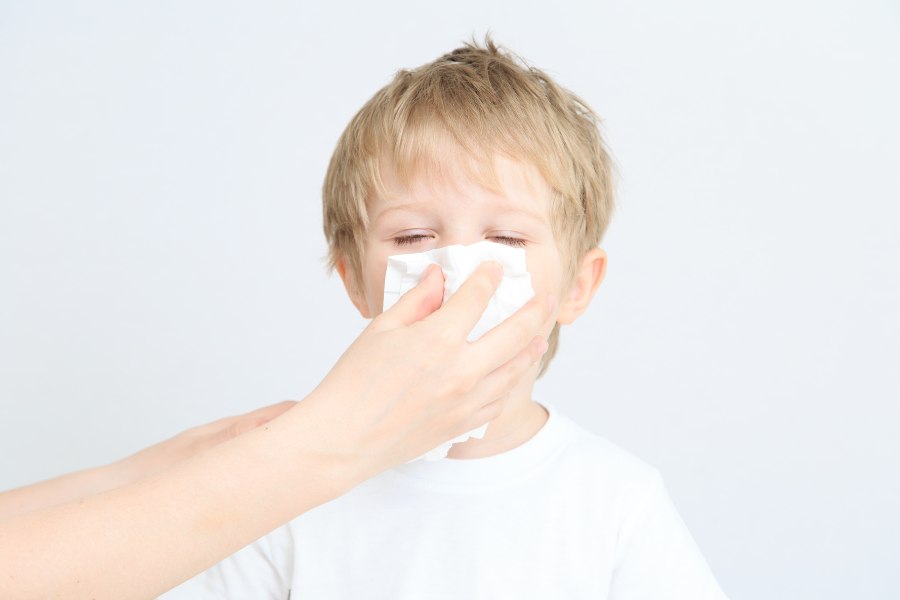
You don’t say if your daughter lacked appetite due to illness or due to her constipation. Her stools could very well be mucousy if she was ill due to a cold.
As I am sure you have already noticed, toddlers tend to get colds quite often.
4. Infections
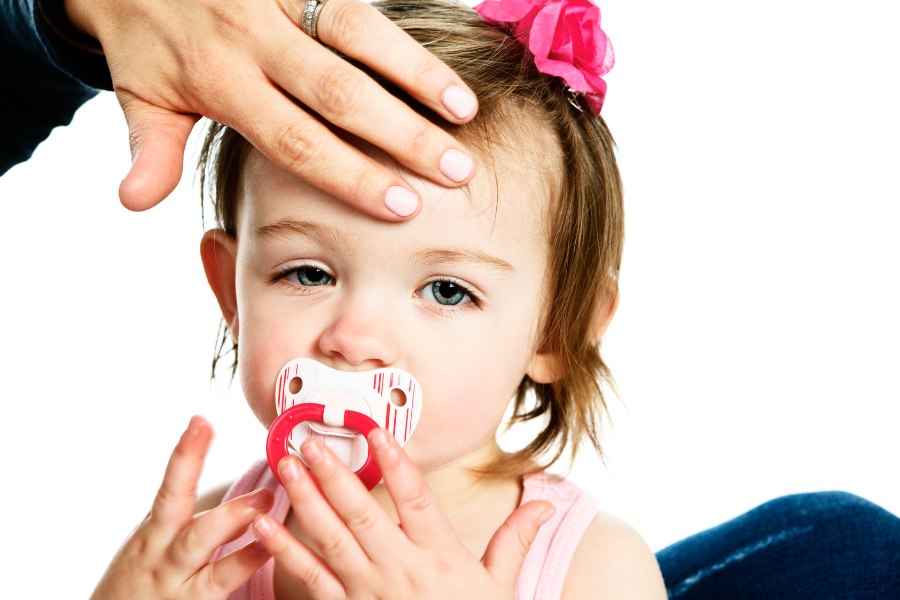
In addition to a regular cold, other infections are also common in toddlers. They often experience gut infections as they are more prone to putting foreign things in their mouths as part of their curiosity.
Bacterial and viral infections can cause increased mucus in the baby’s or toddler’s poop. This is due to inflammation and intestinal wall irritation, increasing mucus production in the colon. The color of the poop can also indicate certain infections. These signs are usually accompanied by other symptoms such as:
- diarrhea
- fever
- irritability
- loss of appetite
- vomiting
- and for certain infections, blood in the poop.
The following infections can cause increased mucus in stools:
Shigellosis – is caused by the Shigella bacteria. This infection causes diarrhea, fever, blood stools (with mucus), and stomach cramps. This infection may last up to 7 days. Treatment includes antibiotics and hydration.
A viral infection caused by Rotavirus – this is common in infants and usually causes watery diarrhea with strains of mucus, fever, vomiting, and abdominal pain. There is no cure for rotavirus; however, there is a vaccine for children routinely given at less than six months of age for two doses.
Salmonella –is a foodborne disease that causes fever, diarrhea, and abdominal cramps. People get infected by ingesting contaminated food or water and uncooked food. This disease can last for seven days but can have long-term effects. Diagnosis is made by testing the patient’s body fluids, tissue, and stools. Treatment includes antibiotics for children below 12 months of age.
Call your doctor if your child appears dehydrated (look for red flags: poor skin turgor, loss of appetite, sunken eyeballs, dry eyes when crying and dry mouth, and abnormally drowsy).
5. Allergies
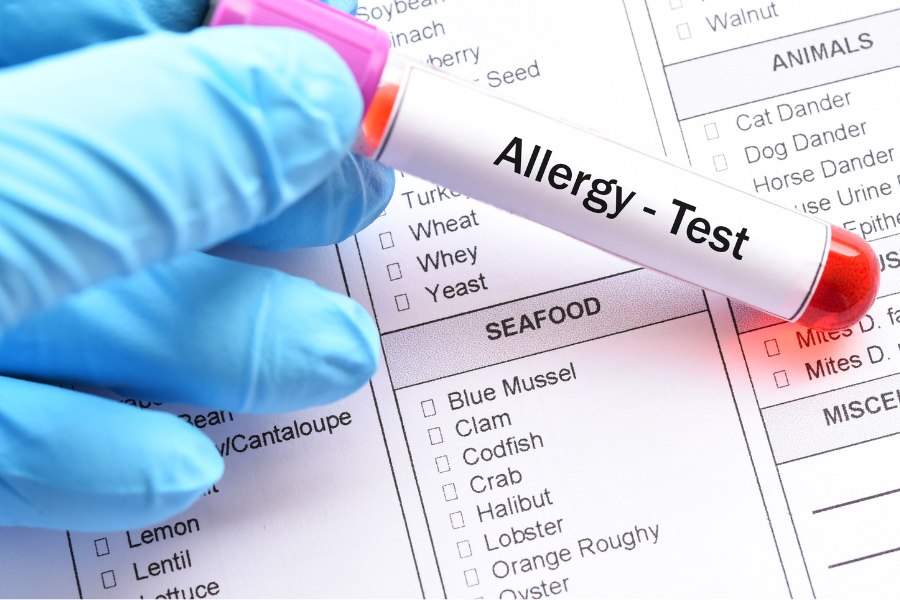
Food or milk allergies can cause constipation in children. Although mucus in stools is not a common sign of milk protein allergy, constipation may be a symptom.
Allergies can cause inflammation in the baby’s gut. Inflammation causes an increase in mucus production and secretion to protect the intestinal lining from irritation and injury. The same mechanism is at play with allergies as it is with infection and constipation; hence, you can usually see mucus on your baby’s stool.
Call your doctor when the signs and symptoms of food and milk allergies persist despite avoiding suspected allergens. If your baby develops diarrhea, vomiting, inconsolable crying or irritability, vomiting, or bloody stools, then it is best to bring them to the hospital or ER.
Read more about milk sensitivity in toddlers here.
6. Teething and mucus/diarrhea?
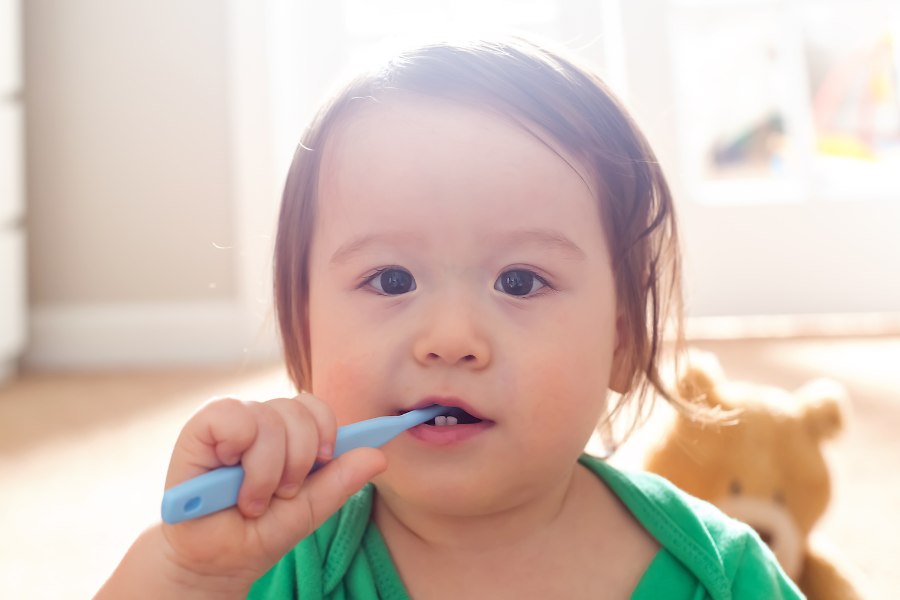
It seems to be quite common for parents to associate mucus in toddler poop with teething. The logic is that a teething baby or toddler will swallow large amounts of saliva, making the poop more mucusy. There is no convincing research supporting this, though.
7. Inflammatory Bowel Disease (IBD)
Inflammatory bowel disease (IBD) is a chronic condition that causes intestinal wall inflammation. There are two types of IBD:
- Crohn’s Disease – this affects any part of the digestive tract.
- Ulcerative Colitis – this affects the lining of the large intestines.
IBD is commonly diagnosed during adolescence and young adulthood; however, a considerable number of kids less than 5 years old manifest symptoms.
In IBD, as with any autoimmune inflammatory disorder, the immune system mistakenly attacks the healthy cells of the gut. The symptoms will depend on and usually indicate the extent of the damage or inflammation in the digestive tract.
The signs and symptoms of IBD include:
- Abdominal pain
- Diarrhea with blood or mucus
- Rectal bleeding
Children may also manifest the following if they have Crohn’s Disease:
- Fever
- Nausea and vomiting
- Weight loss
- Loss of appetite
- Joint pains
Flare-ups and remissions are common.
If your child presents unexplained weight loss and persistence of the other symptoms, you should immediately consult your pediatrician. Lab tests such as blood tests and stool exams will be done, as well as endoscopic procedures.
There is no cure for IBD. Treatment options are managing the symptoms, correcting nutritional deficits, and reducing flare-ups in children.
8. Bowel Obstruction
Intussusception is the most common cause of bowel obstruction in children under two years old. This happens when a part of the bowel folds into another segment of the bowel. The appearance looks like that of a telescope, thereby causing a bowel obstruction. This usually occurs in the junction where the small intestine meets the large intestine.
Intussusception commonly appears in children 3 to 36 months of age but can essentially occur at age. The cause of this is unknown; however, many have attributed this to infections, anatomical abnormalities, and altered motility.
The signs and symptoms of intussusception include:
- Recurrent severe abdominal pain, usually described as crampy (children may be seen drawing their knees up to their chest during periods of pain)
- Nausea and vomiting
- Black currant jelly-like stools (with blood and mucus)
Upon physical examination, an abdominal mass can be palpated in the child’s abdomen.
Diagnosis and treatment include liquid contrast enema or air contrast enema. This is a radiologic procedure that does not require anesthesia. However, surgery is the next step if the radiologic reduction is unsuccessful.
What to Do About Mucus in Toddler Poop
Treatment is relative to the cause of the mucus in the stools. It is often not a cause for concern, as it is normal in children. However, when your child’s mucousy poop is accompanied by any red flags, such as fever, diarrhea, dehydration, abdominal mass, rectal bleeding, or blood in the stools, then you should consult your doctor immediately.
Stomach infections and colds usually heal on their own, and your child’s stool will return to normal over time. One possible way to help your toddler heal is to give her probiotics.
If the mucus is due to constipation, mitigating this issue will also positively affect the amount of mucus on her stool.
If your daughter continues to be unwell, constipated, or has large amounts of mucous in her stools for more than a few days, you should take her to her pediatrician to make sure everything is fine.
I hope this helps,
Paula
More Discussions On Mucus In Baby Stools
Research References
- Hansson GC. Role of mucus layers in gut infection and inflammation. Curr Opin Microbiol. 2012 Feb;15(1):57-62. doi: 10.1016/j.mib.2011.11.002. Epub 2011 Dec 14. PMID: 22177113; PMCID: PMC3716454.
- Rosen MJ, Dhawan A, Saeed SA. Inflammatory Bowel Disease in Children and Adolescents. JAMA Pediatr. 2015 Nov;169(11):1053-60. doi: 10.1001/jamapediatrics.2015.1982. PMID: 26414706; PMCID: PMC4702263.
- Jain S, Haydel MJ. Child Intussusception. [Updated 2022 Apr 16]. In: StatPearls [Internet]. Treasure Island (FL): StatPearls Publishing; 2023 Jan-. Available from: https://www.ncbi.nlm.nih.gov/books/NBK431078/
- HOEKSTRA JH, Toddler diarrhoea: more a nutritional disorder than a diseaseArchives of Disease in Childhood 1998;79:2-5.
- Amber J. Tresca.Causes of Mucus in Stool In babies or adults, a little mucus isn’t always reason for immediate concern
- John Hopkins Medicine. Constipation in Children

Note: This information is intended to provide a general understanding and is not a substitute for professional medical advice. Always consult with a healthcare provider for concerns about your baby’s health.
Comments for “Mucus in Toddler Poop” |
| Aug 21, 2017 | 18 month with snot poop |
Our 18-month-old girl has had diarrhea with mucus in it for two months now. We took stool samples a few days ago and are waiting for the results. Her pediatrician thinks she may have giardia; he is also testing for other parasites and food allergies
| Aug 25, 2017 | Same for my boy |
My son is 14 months and has had the same. We went to the doctor a couple of weeks ago, but he said it was a stomach virus. Since nothing had changed and he was still going to the bathroom six times a day, I went to another doctor, who said to try soya instead of cow’s milk. It did seem to help, but he still poos three times a day, not solid and with some sort of goo. Sometimes it’s like there is still food that has not been digested in his poo. I am going to go back to the doctor soon if things don’t get better. I don’t get too worried because he is in great spirits and is not losing weight.
| Aug 27, 2017 | my girl got mucous on her poop |
I got a 2 yr old lil girl and these past few days she’s having mucous on her poop and poop 7 to 10 times a day, but she still does all the things what she use to do every day she eats ok she plays just fine but when she poop that’s the biggest problem, she doesn’t even want me to touch her butt or put anything on here butt coz its really hurt, do I need to take her to the doctor? pls, I’m a new mom, so I don’t know what to do.
| Aug 28, 2017 | Cold or diet change |
To you who posted on Aug 27,
A child might have mucus in the poop for several reasons. A cold, a stomach bug, or possibly a diet change that includes something the child’s stomach can’t take. Have you introduced any new foods to her recently? If so, revert back to the usual diet, brand, or whatever and see if the problem passes. If not, other possibilities are a cold or stomach infection. Also, mucus is a common side effect if your child recently got antibiotics.
If none of this applies or your daughter appears ill, see a doctor to get it sorted out. Also, check if she has a rash since she seems uncomfortable when you want to clean her.
Good luck, Paula
| Dec 27, 2017 | Mucous and some drops of blood |
Hi, my son who is 20 months old he was having loose motions problem for 4 days in the meantime doctor suggest him entamizole 1tsp 3 times a day after 4 days nothing changed except my son’s stool turned into dysentery including mucous and after one day it had some drops of blood in it then doctor stops the entamizole and suggest him the Flagyl and negram 1sp of each 3 times a day and this dosage is started since last day and I have observed the change which is he is not having the severe cramps in lower stomach and rectum he was active and he is active but getting weak I just checked his feces it had no blood drops thank God, but it was loose and since he is having the upset stomach his feces color is green why is that? and i am not giving him the feed which is two times a day full bottle of Nido stage 1 my doctor told me to stop the dairy products till his feces becomes normal and let me add this from past 2 days he is passing stool twice a day one in the morning and in the late evening.
I am so much worried I am a single parent and I have only son please help me with what I should do and suggest me and one more thing we are giving him white bread n butter in the morning and very soft plain rice with butter added in the evening before getting ill I used to give him whatever I eat like normal n little spicy food he loves it and please suggest me what to give him to eat in the normal days as well.
Thank you very much. Regards
Nick
| Dec 30, 2017 | Improving |
Hi Nick,
I am sorry to hear that your son has been so ill. From what you describe, though, it sounds like he is getting better. Continue to keep a close look at his progress and feed him the way his doctor suggested. Taking away all dairy is often quite good when young children have diarrhea because they can become lactose intolerant for a little while, making diarrhea even worse. Also, try to offer small meals frequently to help his intestines get back on track.
In addition to what you already feed your son, you can try bananas and plain, full-fat yogurt (no sugar) with added probiotics if you can find, but discuss it with his pediatrician; yogurt is much better for his tummy than any other dairy products. Other foods are applesauce (not juice), white pasta and white potato are also good to mitigate diarrhea.
Avoid giving him any fruits that start with a P (peaches, pears, et cetera) since they can worsen his diarrhea, as well as high-fiber foods, apple juice, and apricots.
Hope your son will soon be better,
Paula
| Jan 15, 2018 | changed baby |
my baby will b 2 in a month and for about a month now, she has had problems with pooping, she just literally woke up one morning and decided she wanted to change everything! she used to eat oatmeal every nite and she ate it for like 6 months type thing and she really seemed to enjoy it, then one nite she decides she doesn’t like it and still doesn’t; I’ve tried her with it numerous times, in numerous ways and still lost, now she doesn’t seem to have much of an appetite at all now and she doesn’t care to drink much either. I feel like I put my child to bed and woke up with a different one that looks exactly the same type of thing…
she doesn’t want to poop; if she has to and feels it coming, she squeezes her little cheeks together and holds it in and 2-3 days later I’m left with having to put a suppository up her bum, and I don’t like having to do that to her, I’ve taken her to the emerg and they said its common for this age but none of her friends are going thru this and they prescribed her a stool softener liquid. so I took her to a walk-in pediatrician and he gave me a prescription for a powder “laxative,” I’m guessing is what it was, and a list of foods to try.
I appreciate the different food options to try her on but she won’t eat anything! she won’t even eat foods she used to love!!!
so last nite, my mom and I had stuck soap up her bum, and she pooped twice! yay! but this morning, when we woke up, she had pooped again during the nite, and there was a bunch of green mucus in her poop, and it was runny….is there something wrong with her? am I doing something wrong?? can someone pls help??
| Jan 18, 2018 | toddler poop with mucus |
My 4 yr old tonight had pooped his pants we thought he had purposely pooped his pants cause he always goes by himself on the potty the only times he has pooped in his pants is when he’s outside playing and doesn’t take the time to go in and use the potty. when we stripped him down to bath, I didn’t see poop. I thought it fell out, so I was looking for it and then took a closer look his underwear was just full of slime mucus and his daddy was upset I told him i think he couldn’t help it this time cause he didn’t see it and didn’t want to he gets disgusted with poop but should I be concerned/
| Jan 19, 2018 | Stomach bug |
Hi Danielle,
It could be a stomach bug or something he has eaten. Don’t worry too much; this is the season for all such infections. And the fact that your son pooped in his pants isn’t very strange; he might have felt a need to release some air. You’ll know within a day or two if he is ill or not.
Best, Paula
| Jan 20, 2018 | Incorrect Advice |
No doctor, unless sure that your child is lactose intolerant, should even tell you not to feed cow’s milk to a child, especially a child under 2 years old. When feeding a child soy milk they are losing out on so many nutrients and therefore need supplements to ensure they are getting enough. Just an FYI for anyone out there who is lactose intolerant, goat and sheep milk is a great substitute for cow’s milk. Goat and sheep milk doesn’t contain the lactose that cow’s milk does which can cause the problems. That being said soy, almond, and other such milks are not actually milk. They are created liquid from said products without the same nutritional value.
| Jan 21, 2018 | for “getting frustrated” |
My son started doing the exact same thing when he was about 2 – trying to hold his poop in and refusing to go. The same pinching of the cheeks, he would need suppository or time, and then he would HAVE to go, and it would be huge and very painful. 4 years later, he is on a regular bowel schedule.
Here is what you do – they have to get cleaned out first, enema or suppository. Next, you have to have them on a powder laxative in the morning with their first drink ( my son started with the adult dose per the GI doc and has tapered it down to a teaspoon). It needs to be drunk within 10, min that’s why my son had it first thing, usually, no problem drinking a glass of juice first thing. don’t put the laxative in milk; it does weird things to the consistency. Your child should have a bowel movement every day – at first very loose, and over time it firms up. we also instituted “potty time” in the late afternoon/early evening, as the laxative kicks in about 8 hours after he took it. this is a long process; I know a few people who have had the same thing.
| Jan 23, 2018 | protein intolerance |
Both of my children have suffered from milk/soy protein intolerance (MSPI). They could tolerate NO milk or soy products! In severe cases (like my children) MSPI can cause a baby to SCREAM in pain for up to 20 hours a day, and it can make their poop green, with mucus in it, and sometimes they can bleed from it too.
With some children, it is discovered within a week after they are born, and with some, it is not discovered until later, even up into their 2nd year in life. A lot of children outgrow it between 1 and 3 years of age. It is not something a lot of doctors know about.:( You can read about it in a book titled “Colic Solved” written by Dr. Vartabedian. You can also find info online about MSPI.
I have recently found that a product called Digestive Health made by Core Health Products is EXTREMELY helpful. It has enzymes and probiotics in it. The reason that my children can not tolerate milk protein is that they do not have enough enzymes to break it down. With Digestive Health pills, they have improved by 90%!!! :) I am told by the owner of Core Health Products (Shan Stratton) that so many children and adults have digestive problems or acid reflux because they lack enough enzymes to break down their food.
| Jan 23, 2018 | cows milk |
There are more negative attributes to cows milk than positives. we do not NEED cow milk. We are the only species that take milk from another mammal after 2 yrs of age
| Jan 26, 2018 | XRAYS |
My toddler has the same thing going on, and it turns out that he is so constipated that the slimy lining in his intestines is trying to help push that poop out, and that is the mucus coming out. Also, he has loose stools coming out around the constipated poop and has been throwing up because the food has nowhere to go but up. He has been fevered because of the toxins in his body. It was first mistaken for the same things as you have all said. Ask for tummy X-rays. They were a saver for him!
| Feb 28, 2018 | Baby poop |
My baby is 10 months.his poop is greenish smelly mucus-like with white patches; what might be the problem
| Feb 28, 2018 | The possible cause of green poop with mucus |
That certainly sounds like your little one might not be properly digesting dairy (and maybe soy) proteins. That is what was wrong with my children and they had mucousy green poop and also blood mixed in sometimes.
Add your own comments below.

Paula Dennholt founded Easy Baby Life in 2006 and has been a passionate parenting and pregnancy writer since then. Her parenting approach and writing are based on studies in cognitive-behavioral models and therapy for children and her experience as a mother and stepmother. Life as a parent has convinced her of how crucial it is to put relationships before rules. She strongly believes in positive parenting and a science-based approach.
Paula cooperates with a team of pediatricians who assist in reviewing and writing articles.

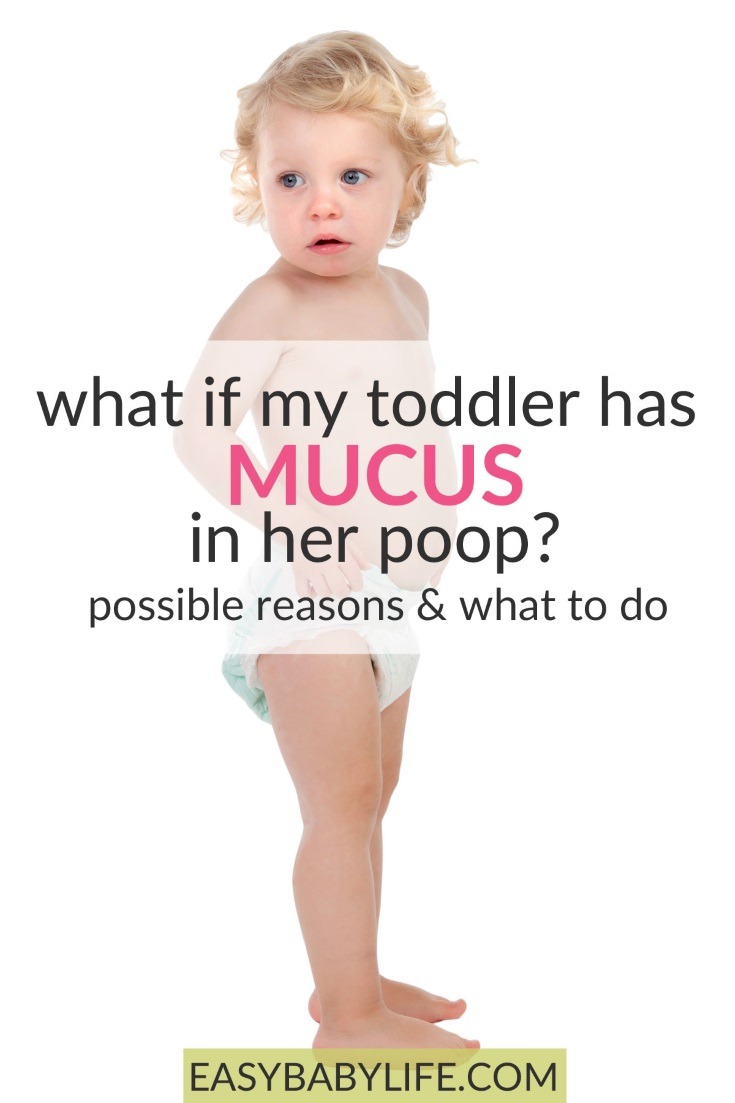



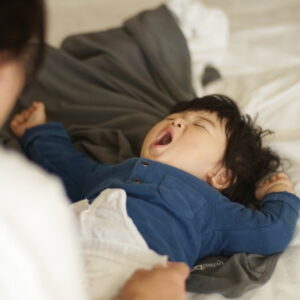

If your child has mucus in his/her diaper there is a good chance that your child has some food allergies. Have him/her checked by blood test.
My son is two years old and just started daycare last week. This week his poop is loaded with mucous and has changed from a usual dark browny green to light brown and very loose. He has no fever or other symptoms. Should I be concerned??
My toddler is 2 years old and also has very loose stools which appear quite mucousy and light brown in color. This started after he went to nursery and has been going on for some time. I’m completely confused about what to do so if you find anything out about this type of problem can you post it onto here thanks, 🙂
My son will be 3 in September, and for the past several days he has been pooping about 7 times a day and his poop is loose and slimy… It is making his butt so sore and red it makes him cry because it hurts so bad.
He is eating normal, playing normal .. everything else is normal. I even checked to make sure he was not getting any molars, and he is not. I am starting to get a bit worried, anybody else ever have this type of problem? and if so.. do i need to take him to the doctors?
My baby is two and half and has had this same problem with poop about 7 to 10 times a day. Real soft slimy and frequent his lil butt is red from irritation so I’m using Burt’s bees and It works amazing but it burns a little when you first put it on. But I think there is a bug. going around
Dear Moms and Dads,
Everyone is different, your personal feelings for or against a certain food/diet/etc. are not helpful nor very productive to the conversation.